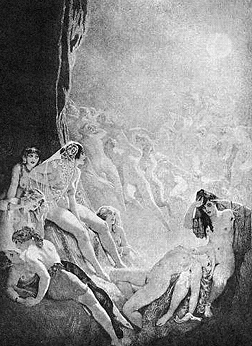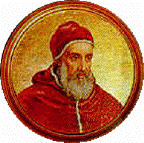August 7: Religion and Virginity
The Virgin Mary (1555)
Religion and Virginity
It was on this date, August 7, 1555, that Pope Paul IV, newly elected and nearly 80, issued an Ecclesiastical Constitution called "Cum quorundam," making it an article of faith that Mary, the mother of Jesus, "was a virgin before, during, and after the conception and birth of her" son.
The idea of the Virgin Birth, which is to say the birth of a holy man to a virgin, was not invented with the Christian myth: it has many pagan parallels. The Ancient Egyptian queens were believed to have been impregnated by the gods – though the Egyptians had so many gods it was difficult to objectively establish paternity. Zeus was notoriously hot for human women, and fathered children of Leda, Semele and Danae, among others. The myth even extends to the mother of the first Japanese Emperor and the mother of Buddha, giving birth through divine favor. The stories of Zeus's carousals were well known to the early Christians, and contemporary Jews accused them of borrowing the story for Matthew's Gospel – but Mark's Gospel (the first written) and John's, make no mention of the birth of Jesus.
What is rarely asked is: why did Mary necessarily have to be a virgin? What is it about virginity that it is glorified, when is it not "fetishized"? In the Gospels, there was no concern for the perpetuation of the species, and therefore virginity and chastity were encouraged, because the world was expected to end before the last apostle died, anyway.
 The idea of virginity, chastity and abstinence being somehow blessed and desirable is further proof that Christianity borrowed the worst ideas from the pagans from which to fabricate their religion. The oldest forms of worship were animist or Pantheist: the worship of the bounty of Mother Earth, the harvest, and so on. The fertility of humans being as important as that of cattle, this matriarchal religion, along with phallic elements, was a natural result.
The idea of virginity, chastity and abstinence being somehow blessed and desirable is further proof that Christianity borrowed the worst ideas from the pagans from which to fabricate their religion. The oldest forms of worship were animist or Pantheist: the worship of the bounty of Mother Earth, the harvest, and so on. The fertility of humans being as important as that of cattle, this matriarchal religion, along with phallic elements, was a natural result.
However, a competing religious idea arose in the Mediterranean, that of a Sky-God, and descended on the Mother Earth worshipers with an ascetic, that is an anti-sex, view of sex. The Sky-God pronounced the flesh evil, sinful, inhabited by the devil (or some such demonic force). By the sixth century BCE, the idea was thoroughly developed in Persia with Ahura Mazda – and it's male-dominated, patriarchal precepts spread like weeds over the ancient world. Christianity was only one of many religions to adopt asceticism as a virtue and the degradation of women (and the Earth) as fidelity to the Sky-God.
But asceticism and celibacy are no more natural than fasting and flagellation. And the denial of fundamental human needs leads to lying, perversion, and disrespect for authority. Abstinence for the sake of some negligible notion of purity is also pointless, as Andrew Marvell pointed out in his poem, "To His Coy Mistress":
...Thy beauty shall no more be found,
Nor, in thy marble vault, shall sound
My echoing song: then worms shall try
That long preserved virginity:
And your quaint honor turn to dust,
And into ashes all my lust:
The grave's a fine and private place,
But none, I think, do there embrace...
(published 1681)
Paul's constitution on the virginity of Mary was reaffirmed by the Catholic Church as late as 1968, as if to "...make our sun Stand still." It was for freethinkers to draw back the curtain on the past and say, "...yet we will make him run."
Originally published August 2003 by Ronald Bruce Meyer.


